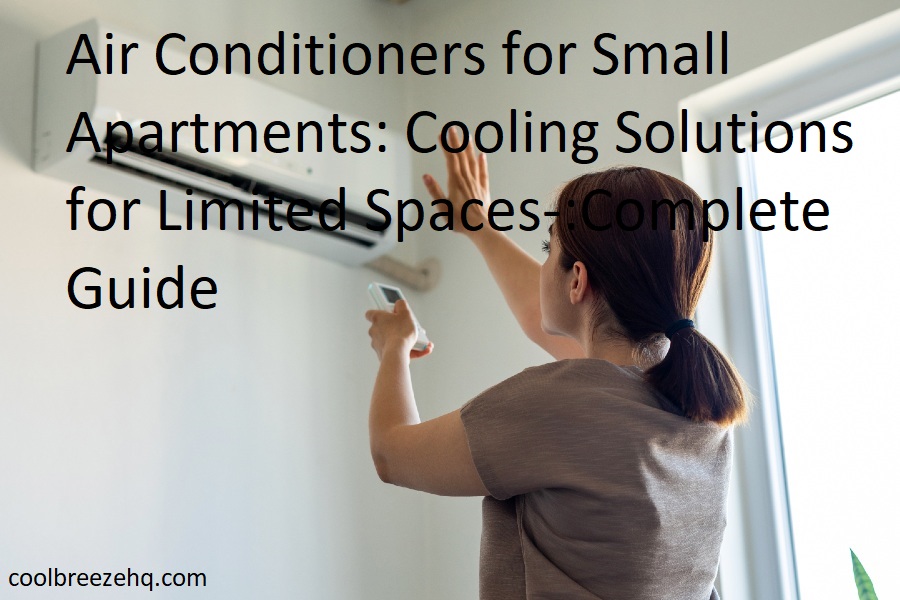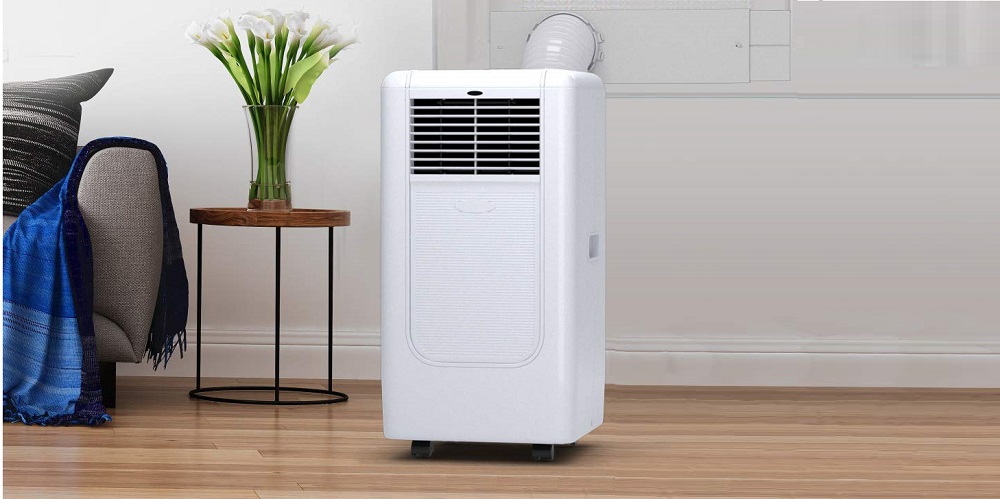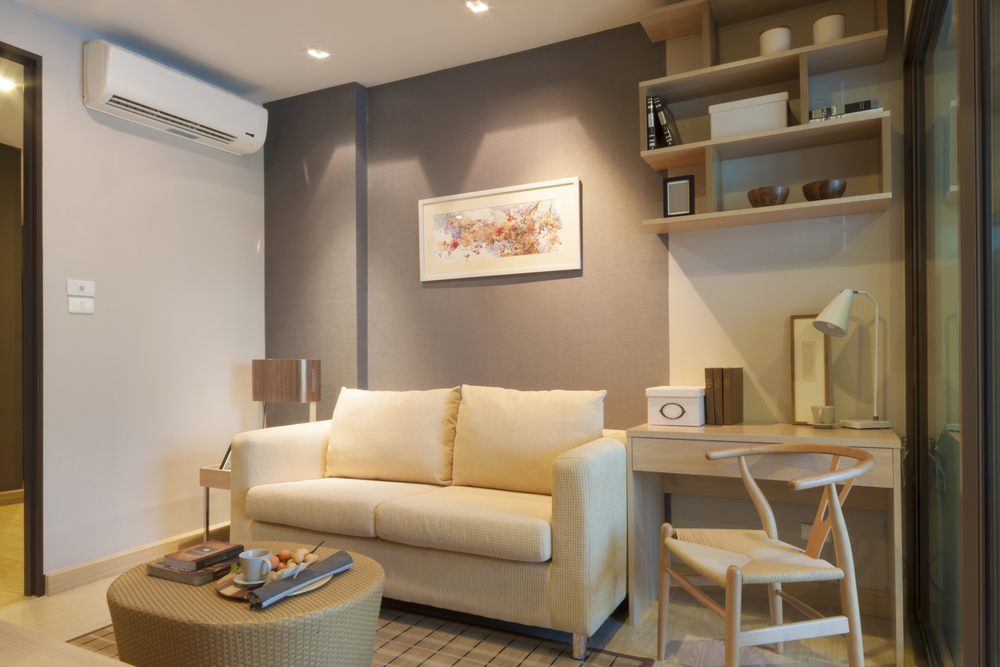Tired of sweating in the summer heat? You don’t have to compromise on comfort anymore. Finding an air conditioner for a small apartment is no longer a challenge.
In this comprehensive guide, you’ll learn about the best cooling solutions to keep your home comfortable without breaking the bank.
Air conditioners are an important part of keeping a small apartment cool in the summer. Living in a small space can make it difficult to install a traditional window unit, but there are options available for those who need to keep their apartment cool without taking up too much room. This guide will provide an overview of the different types of air conditioners available, as well as tips on choosing the best cooling solution for your needs.
We’ll also discuss some of the ways you can reduce energy consumption and save money when using an air conditioner in your small space. By following these tips, you’ll be able to keep your apartment comfortable and your energy bill low even during hot weather months. We’ll start by exploring some of the most popular types of air conditioners specifically designed for smaller spaces and apartments, from portable units to mini-splits and ductless systems.
Definition of Air Conditioning
Air conditioning is the process of removing heat and humidity from a specified indoor space to improve comfort. Air conditioners are used in both residential and commercial buildings, and they work by cooling the air inside a building while simultaneously drying it out. Air conditioning systems vary in type, size, efficiency, cost and other features. A proper air conditioning system should be selected based on the conditions of the area you wish to cool.
In general terms, air conditioners are either single split or multi-split systems that can contain 1, 2 or more connected indoor units that releases cooled clean air. Single split systems have only 1 indoor unit connected to one outdoor unit and are best suited for smaller areas. Multi-split systems provide better efficiency for larger spaces since multiple indoor units can be connected to one larger outdoor unit making them ideal for high rise buildings or multiple room dwellings such as apartments. The size of these systems dictate their cooling capacity so it is important not to buy an inadequate system as temperature control may be harder than ideal.
Importance of air conditioning in small apartments
Small apartments are common in densely populated urban areas, and many people living in these cramped spaces find it difficult to regulate the temperature without an air conditioner. While some argue that air conditioning is an unnecessary expense for small apartments, the benefits of cooling a home can be significant. Air conditioning helps to create a comfortable living environment, reduce energy consumption and provide additional protection from airborne allergens.
Air conditioners are essential in hotter climates that typically experience high temperatures and humidity; however, many people still choose to install air conditioning systems in their small apartments even if they live in cooler climates due to the other benefits that come with having one. Installing an efficient air conditioning system will not only keep you cool but will also help to reduce energy consumption by regulating indoor temperatures more efficiently. Additionally, by filtering out airborne impurities like dust mites, pollen and pet dander, an air conditioner can help keep your living space clean and safe for those suffering from allergies or asthma.
For individuals looking for options regarding types of air conditioners appropriate for smaller spaces, there are several models available on the market designed specifically to meet these needs. Energy efficient split-systems as well as more compact window units are just two examples of how manufacturers have tried to address the needs of those looking for a cooling solution without taking up too much space or using too much energy.
Purpose of the guide
This guide is for anyone living in a small apartment or house who is looking for the best ways to cool their space.
We’ll provide step-by-step advice on how to choose the most suitable air conditioners and other cooling solutions, along with a complete list of cooling options from chillers to window air conditioners, portable air conditioners and fans.
Our goal is to help you find the most efficient and cost-effective cooling solution for your specific needs. Each option has its own advantages and drawbacks that we will thoroughly explain, so you can make an informed decision that fits both your budget and your needs.
Factors to consider when choosing an air conditioner for a small apartment
Choosing the best air conditioner for a small apartment requires careful consideration of a range of factors. It is important to evaluate various size requirements when selecting an air conditioner, as well as noise levels and energy efficiency ratings. Additionally, it is essential to consider the climate you live in, as well as the type and layout of your apartment.
Size Requirements: The size of an air conditioner you choose should reflect its cooling capacity. The British Thermal Unit (BTU) rating indicates how powerful or cool it can be. Generally speaking, bigger apartments require larger BTUs while smaller apartments often need lower BTUs to ensure effective cooling without creating excess cold spots.
Noise Level: Noise output plays an important role in choosing the right AC for small apartments- Residences located in multifamily homes may disturbed by excessive noise coming from other units or street traffic which could potentially drown out the sound of your air conditioner, making a whisper-quiet model a desirable choice.
Energy Efficiency Ratings: Air conditioning units range from 10 to 20 SEER (Seasonal Energy Efficiency Ratio). A higher SEER rating typically indicates higher cost but more Energy efficiency over time for operation. For small apartments where energy costs are likely more significant using very powerful yet energy efficient models may be favourable.
Climate and Apartment Layout: FOr effective cooling, there should be adequate airflow in relation to the size of your apartment performance will also depend on external temperature variations which can vary with different seasons or geographic regions. For climate zones with extreme summertime temperatures such as desert climates or subtropical climates, investing in a highly efficient system is recommended Industrial-grade monobloc ACs are typically good options for small flats due to their robust design and easy installation.
Room size
Air conditioners come in many shapes and sizes, and the right one for your small apartment or room will depend on the size of the room. In general, a larger air conditioner will be able to cool a larger space more efficiently. To determine what size air conditioner is best for you, calculate the square footage of the space you need to cool. Then refer to your air conditioner’s energy guide label which lists BTUs (British Thermal Units), or cooling power, rating of the appliance. The higher the BTU rating number, the bigger a room it can cool effectively.
Here is a general reference guide for square footage and room size:
-Up to 150 sq. ft.: 6,000 – 8,000 BTUs
-150–250 sq. ft.: 8,000 – 10,000 BTUs
-250–300 sq ft.: 10,000 – 12,000 BTUs
-300–350 sq ft.: 12,000 – 14,000 BTUs
-350–400 sq ft.:14 ,000 – 18 ,500 BTUs
Energy efficiency
When shopping for an air conditioner, energy efficiency should be a major consideration. Room air conditioners are rated by their energy efficiency ratio (EER). This is the ratio of the cooling capacity (in British thermal units [BTUs] per hour) to the power input (in watts). The higher the EER rating, the more efficient it is. An air conditioner with an EER of 9 or greater is considered good and one with an EER of 11 or higher is considered excellent for energy efficiency.
The cooling capacity of an air conditioner determines its size; more powerful models are more expensive to buy and operate, but they cool much faster than less powerful units. Consider spending slightly more up front on a unit with higher-rated BTUs if you’re planning to use it in a larger space. If you go too small, your unit will run continuously and take forever to cool down a hot room–possibly raising your electric bill significantly in the process.
Additionally, look for models that feature sleep settings and automatic shut-off timers that can help ensure maximum energy efficiency when not in use.
Noise level
When it comes to air conditioning in small spaces, noise level dissatisfaction is often a common issue due to lack of space to separate the unit from living or sleeping quarters. If the AC unit is placed too near a bed, for example, its noise can disrupt a person’s sleep.
It’s essential to check the rating of the decibel (dB) level on any unit you consider buying. Seek an AC with a labeled decibel rating equal to or less than 55 dB — this will allow you to feel sure that your unit won’t be so loud that it interrupts the peace and quiet of your home environment when running.
Noise levels are rated according to how clearly they can be heard — i.e., whisper quiet is around 30 dB and normal conversation is 60 dB — so make sure you select an option that causes minimal disruption wherever possible in order to avoid frustrating customers who want an air-conditioned environment but also require peace and calm for peaceful living.
Ease of installation
Ease of installation is an important factor to consider when purchasing an air conditioner for your small apartment. Some air conditioning units are portable and have a simple, plug-and-play setup that requires minimal tools and time. Others need professional installation, or at least some assistance from a friend or family member. Be sure to weigh up the ease of installation against the features that the product offers in order to determine the right unit for you.
The following are some questions that you should ask before choosing an air conditioning unit for your small apartment:
- Does the unit come with all necessary components for installation?
- Does it require professional installation?
- How many people will be required to install it?
- Will additional tools or accessories be necessary for installation?
- Are there any specific steps that need to be taken in order to ensure safe setup and operation?

Cost
When choosing an air conditioner for a small apartment, one must consider the cost. It is also important to take into account the energy efficiency of the unit. More efficient air conditioners can lead to lower energy bills, which can ultimately make them more affordable in the long run. Additionally, some electric companies offer incentives or discounts on units that are Energy Star certified or environmentally friendly.
Other cost factors to consider when selecting an air conditioner for a small apartment include installation costs, as these can range drastically depending on the type and location of unit. Installation may require specialized knowledge and/or equipment that a professional HVAC technician may be able to provide but at an additional cost. Additionally, delivery fees, applicable warranties and other miscellaneous costs should be considered as well when making a purchase decision.
Conclusion
In conclusion, when choosing an air conditioner for a small apartment, size and placement are key factors. Consider how much space is available in the living area and make sure that the unit is a suitable fit. Moreover, be mindful of the placing of the unit since this can have an impact on both noise level and cooling performance. By investing in a high-efficiency air conditioner combined with proper installation, incoming air filters and ventilators it is possible to ensure that your smaller space can remain comfortable at all times.
Finally, do not forget to consider both energy consumption and cost levels when deciding on the best cooling solution for your home.
FAQ
Can one AC cool multiple rooms?
Yes, one AC can cool multiple rooms if it is powerful enough and has the proper ductwork and vents to distribute the cooled air to each room.
What is the best cooling system for a small room?
A window AC unit or a portable AC unit is generally the best cooling system for a small room.
What can I use instead of AC for cooling?
Some alternatives to AC for cooling include fans, evaporative coolers, and heat-reducing techniques like shading windows and using light-colored curtains.
How many rooms can a ductless AC cool?
The number of rooms that a ductless AC can cool depends on the size of the AC unit and the layout of the rooms. Generally, a ductless AC can cool between one and four rooms.
What size air conditioner will cool 2 rooms?
The size of air conditioner needed to cool two rooms depends on the square footage of the rooms and other factors like ceiling height and insulation. A professional HVAC technician can help determine the correct size AC unit needed.
Can one AC cool a whole apartment?
It depends on the size of the apartment and the power of the AC unit. A central air conditioning system can typically cool an entire apartment, while a window or portable unit may only be effective in one room.
How many square feet can 1 AC unit cool?
The number of square feet that one AC unit can cool depends on the size of the unit, the layout of the space, and other factors like ceiling height and insulation. A professional HVAC technician can help determine the correct size AC unit needed.
What is the simplest cooling system?
The simplest cooling system is a fan. It doesn’t require any installation or maintenance, and it can provide immediate relief from the heat.
How can I make my room cooler without AC or cooler?
Some ways to make a room cooler without AC or a cooler include using fans, keeping windows closed during the day, using light-colored curtains, and minimizing the use of heat-producing appliances.
What is the cheapest cooling option?
The cheapest cooling option is typically a fan. It doesn’t require any installation or maintenance, and it uses very little electricity compared to other cooling options like AC units or evaporative coolers.
See more-
- Best window air conditioner with heat 2023
- Best 8000 btu air conditioner 2023
- Best wall mounted air conditioner heater combo 2023
- Best 6000 btu air conditioner 2023
- Best ventless air conditioner 2023

